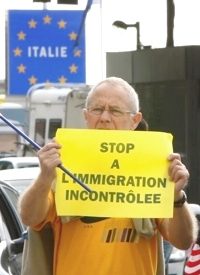
The war has begun over what to do with the Tunisian migrants who flooded Italy, which country then threatened to scatter them across Europe. Last week, France blocked a train carrying the Africans at its border with Italy, which prompted an immediate protest from the latter. What to do with the 25,000 migrants who fled Tunisia after its government fell, and then flooded the Italian isle of Lampedusa, has been a matter of some concern since the “biblical exodus,” as officials termed it, began in January.
Now, Europeans are fighting with each other over how to stop the Tunisian hemorrhage.
Tunisia Falls; Lampedusa Swamped
The trouble began for Italy in January when the Tunisian government collapsed. In a matter of weeks, 5,000 Tunisians had swamped Lampedusa, a small tourist and fishing island in the Mediterranean 127 miles southwest of Sicily and only 75 miles from Tunisia. The first wave doubled the population. “There is an entire nation trying to escape Tunisia to reach Italy and then to go on to other countries,” Lampedusa Mayor Bernadino Rubeis said at the time.
By the end of March, about 20,000 migrants had landed. The African horde overwhelmed the island. Lampedusa’s former mayor worried about a food shortage. “If the ships promised by the government don’t come tomorrow, there will be a total shut down and no one will be able to eat on the island, including the immigrants who arrived last night,” Salvatore Martello said. The other peril was a water shortage, given that the island’s only source of water is rainfall.
Tunisians — and Libyans, who had also begun arriving because of the unrest in that country — trashed the island. London’s Daily Mail published photographs of piles of boats near the shores and the other debris and detritus that a mass migration of humanity sloughs off.
Visas Issued
In early April, Italy began transferring the Africans to its mainland, with Prime Minister Silvio Berlusconi claiming that Lampedusa would be inhabited only by Lampedusans. Italy then began issuing temporary visas. Those visas entitle the migrants to travel in the Schengen travel zone of Europe, which encompasses most of Western Europe, without being stopped. The move began a diplomatic dispute with France because French officials did not want thousands of Tunisians piling on trains and crossing the border.
As Agence France Presse noted, the conflict became a diplomatic war:
“Paris and Rome at War”, “Italy-France Confrontation”, “Row with France”, read some of the headlines, with the Corriere della Sera daily accusing France of “duplicity” and Il Giornale saying that the migrants were “a human bomb”.
Italy argued that France was violating the terms of the Schengen travel agreement, because the temporary permits allow travel across Europe. Despite the controversy, the two nations began air patrols to stop migrants from reaching Italy.
Italy and Tunisia agreed that any of the boat refugees who landed on Italian soil before April 5 would be granted a six-month residence permit, while anyone arriving after that date would be deported. When the first plane left for Tunisia with 30 migrants aboard, a boat carrying 226 landed on Lampedusa. By that time, the population of Tunisians had been greatly reduced, having been packed off to the Italian mainland. The arrival of the 226 brought the number of Africans to 1,500. Despite the Italian hospitality, Tunisians on the island rioted to protest the repatriation plan.
French patrols turned Tunisian migrants away at the French-Italian border, and then the matter escalated last week when France stopped a train. French officials said they stopped the train because political activists were planning demonstrations in France.
As well, The Associated Press reported,
France says it will honor the permits only if the migrants prove they can financially support themselves and it has instituted patrols on the Italian border — unprecedented since the introduction of the Schengen travel-free zone — bringing in about 80 riot police last week. Germany has said it would do the same.
In other words, neither France nor Germany wants to accept the Tunisians.
EU Wants Action from Tunisia
In mid April, the European Union demanded that Tunisia do more to stop the flight of its people to Europe. EU President José Manuel Barroso flatly stated that it expected action from Tunisia, the BBC reported, given the $202 million in extra aid the EU will give to the country.
According to the BBC,
“Europe is ready to help you with additional means, but we also need the Tunisian authorities to do more,” Mr Barroso said, referring to plans to make available up to 140m euros on top of the existing budget of 257m euros in 2011-2013.
“Migration should be regarded as a common challenge, a shared responsibility. We expect from Tunisia strong and clear action in accepting the readmission of its nationals who are in Europe illegally, and in the fight against illegal migration.”
Related stories:
Refugees Besiege Italian Island of Lampedusa
Italy’s Frattini: If Ghadafi Falls, Refugees Will Overwhelm Europe
Camp of the Saints Comes to Italy?
Photo: A Frenchman holds a banner reading “stop uncontrolled immigration,” on the French side of the border between France and Italy, in Menton, April 15, 2011.: AP Images


